|
|
|
Sort Order |
|
|
|
Items / Page
|
|
|
|
|
|
|
| Srl | Item |
| 1 |
ID:
138966


|
|
|
|
|
| Summary/Abstract |
This writing analyzes the use of symbols, art, and aesthetics in the first phase of Hong Kong’s “Occupy Central” movement. Protestors, demonstrators, and strikers appropriate symbols to put their political messages across, sometimes essentializing or reducing complicated and complex ideologies or reform initiatives to pictorial symbols and performative sessions to parsimoniously put their points across. Between the start of Hong Kong’s “Occupy Central” movement on 27 September 2014 and its temporary pause on 6 October 2014, many symbols and art forms were used to symbolize the protests including the yellow umbrella. This writing is based on the observations in Hong Kong (more than 4 years) as well as formal and informal discussions with individuals representing positions from all sides of the political divides (pro-government, pro-democracy, and pro-Beijing forces) within and outside Hong Kong. Textually, I collected media reports, downloaded digital images, and scanned and analyzed media commentaries for this writing.
|
|
|
|
|
|
|
|
|
|
|
|
|
|
|
|
| 2 |
ID:
148381
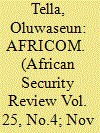

|
|
|
|
|
| Summary/Abstract |
The United States (US) Africa Command (AFRICOM) was launched in 2007, ostensibly to foster African security. Rather than focusing on traditional military operations, AFRICOM also embraces non-military activities such as humanitarian aid and African development. This begs the question as to what type of power (hard or soft) the US intends to wield through AFRICOM. Several US official statements have emphasised the soft power attributes of this military project. To this end, this article seeks to respond to two fundamental questions. First, is AFRICOM a soft power project? Second, how, if at all, has AFRICOM enhanced perceptions of the US in Africa? The article concludes that sceptical and negative perceptions of AFRICOM inhibit its soft-power objective of winning the hearts and minds of the African people.
|
|
|
|
|
|
|
|
|
|
|
|
|
|
|
|
| 3 |
ID:
130243
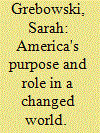

|
|
|
|
|
| Publication |
2014.
|
| Summary/Abstract |
I'll never forget my brief and ill-received show of American patriotism as a young expatriate in Beirut. It was the summer of 2010, and the city was teeming with convoys of Lebanese youth honking and waving flags to celebrate their favorite teams' victories in the World Cup. After an exciting win by the US, I joined a group of Americans in a street celebration. But cruising down the main thoroughfare of West Beirut, our procession of stars and stripes was met with disapproving looks. The image that remains with me to this day is that of an older man standing silently with his shoe in his hand. The tattered sole was pointed directly at us, an expression of disrespect in Muslim culture. We recognized the gesture's meaning only because a similar shoe had been thrown at the American president's head a year earlier.
Today's generation of young Americans, known as the millennials, has come of age at a time when America has been humbled on the world stage. Many of them have traveled extensively at a young age and experienced this diminished reputation firsthand. Their parents and grandparents believe that America has been a remarkable force for good in the world and that the country should not lose sight of its responsibility to shape events globally because of mistakes made in the last decade. But millennials seem more fixed on the limits of American power and disenchanted with ideas of American exceptionalism.
Because of these reservations, the millennial generation is often described as declinist or isolationist. I disagree. Young Americans care more than any other age group about what happens beyond our borders. Millennials tend toward multilateralism and the cautious use of force, and perhaps would be more selective in committing US resources overseas. But far from an abdication of global leadership, this prudence may prove to be the silver lining to millennials' crisis of confidence in America's role as, in President Obama's words, "not just a place on a map, but the light to the world."
|
|
|
|
|
|
|
|
|
|
|
|
|
|
|
|
| 4 |
ID:
155180


|
|
|
|
|
| Summary/Abstract |
The first decade of the twenty-first century saw the chants of the rise of an Indian superpower. These claims of the twenty-first century as India’s century were not only based on the massive economic growth that the country saw in the post-1991 liberalisation period, and the concomitant boost in military infrastructure, but also by virtue of its having the biggest functional democracy, an influential multi-million plus diaspora, the sway of Bollywood in the region and abroad and the spectacular religious-linguistic diversity of the country. From conducting mega disaster-relief operations during the 2004 tsunami to effectuating the world’s largest civil evacuation during Operation Rahat, India has ceaselessly augmented its soft power potential to project its national power in the region. This article is an attempt to analyse the possibilities and challenges that India faces in the effective functioning of its soft power in the region. It also remarks as to how India’s soft power limitations can be quashed by integrating a smart power approach in its foreign policy by strengthening existent digital and public diplomacy infrastructure.
|
|
|
|
|
|
|
|
|
|
|
|
|
|
|
|
| 5 |
ID:
169366
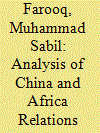

|
|
|
|
|
| Summary/Abstract |
China’s ‘One Belt One Road’ (OBOR) initiative has been billed as its most ambitious project ever in trying to shape and influence behaviour in the international system in line with her growing stature. At the same time, growing Sino-Africa relations have been the subject of scholarly debate with supporters taking an optimistic view, also presented by China itself, of this relationship being a win-win partnership. Critics led by the United States argue China is just using Africa to extract resources for its use, an allegation it refutes. The authors therefore sought to look at Sino-African relations but focussing on the implementation of OBOR in the African continent. Being the centrepiece of China’s foreign policy since 2013, a study on OBOR in Africa will give an understanding and hopefully answer some questions surrounding these relations. The lack of official bilateral agreements between China and some African countries has been examined, together with the possibility of expansion of the OBOR initiative to cover more African states.
|
|
|
|
|
|
|
|
|
|
|
|
|
|
|
|
| 6 |
ID:
188814
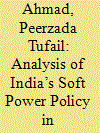

|
|
|
|
|
| Summary/Abstract |
Since 2001, India has pursued a non-military, non-coercive and co-optive (soft power) policy towards Afghanistan. India’s soft power approach of forging economic (aid), humanitarian, capacity building and institutional links vis-à-vis Afghanistan tried to win the hearts and minds of the Afghan government (pre-August 2021) and the ordinary Afghans. The data reveal that India has impacted and generated goodwill by spending billions of dollars on infrastructure. The method used in this study is primarily analytical and explanatory. The research for this study is based on both primary and secondary sources, collected from both archival and online resources. The focus of this article is to comprehensively study and evaluate the usefulness of India’s soft power policy in Afghanistan since 2001.
|
|
|
|
|
|
|
|
|
|
|
|
|
|
|
|
| 7 |
ID:
095869
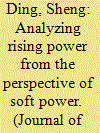

|
|
|
|
|
| Publication |
2010.
|
| Summary/Abstract |
A rising power has traditionally been considered as a revisionist power in realist international relations theories. However, a preliminary analysis of the rising China's foreign policy behavior doesn't uphold such conventional wisdom. Through the case study of China's rise, this article investigates whether the soft power concept provides a new approach in analyzing a rising power. Firstly, empirical connections between soft power and the rise of China are established by discussing the Chinese idea of soft power. This is followed by an examination of how China adopts a soft power-based global strategy and wields soft power in its rise to a status quo power. The findings suggest that the soft power concept can be applied to analyze a rising power. Moreover, when a rising power tries to develop its soft power resources and wield its soft power, its revisionist policy orientation will greatly decrease. This in turn allows for a smoother transition to a status quo power.
|
|
|
|
|
|
|
|
|
|
|
|
|
|
|
|
| 8 |
ID:
147758
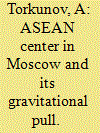

|
|
|
|
|
| Summary/Abstract |
EARLY IN APRIL 2016, MGIMO hosted the third meeting of the ASEAN-Russia Eminent Persons Group. During the meeting, held at the MGIMO compound in Moscow, the group finished the mission for which it had been set up and definitively approved a draft report on prospects for dialogue partnership between Russia and the Association of Southeast Asian Nations. The draft report was due to be put before an ASEAN-Russia summit in Sochi in May this year.
|
|
|
|
|
|
|
|
|
|
|
|
|
|
|
|
| 9 |
ID:
095392
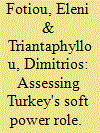

|
|
|
|
|
| Publication |
2010.
|
| Summary/Abstract |
Turkey's proactive foreign policy directed at assuming a regional or even global "soft power" role has created heated debate. This development may be explained as the result of the Europeanisation of Turkish political culture and its impact on foreign policy behaviour, as a globalisation trend, as a bargaining card towards the West or even as an alternative foreign policy option. Arguably, the ideas of Ahmet Davutoglu, Turkey's new foreign minister, have contributed at the level of rhetoric; meanwhile, the emphasis of the country's foreign policy on its eastern neighbourhood seems to have less to do with the ruling party's religious premises, than with a rational choice towards the development of an independent foreign policy agenda. It remains to be seen whether this change in rhetoric in Turkish foreign policy will develop into a substantial shift in practice.
|
|
|
|
|
|
|
|
|
|
|
|
|
|
|
|
| 10 |
ID:
138955
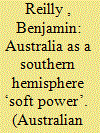

|
|
|
|
|
| Summary/Abstract |
The 2014 Group of 20 (G20) leaders’ meeting in Brisbane was hailed as the largest gathering of international leaders ever held in Australia. While media attention was focused on the presidents of great powers of the northern hemisphere—the USA, China and Russia in particular—the meeting also featured the first Australian gathering of the major powers of the southern hemisphere, including Argentina, Brazil, Indonesia, South Africa and, of course, Australia itself.
|
|
|
|
|
|
|
|
|
|
|
|
|
|
|
|
| 11 |
ID:
143522
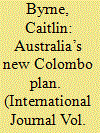

|
|
|
|
|
| Summary/Abstract |
The New Colombo Plan (NCP), a key plank in the Australian government’s foreign policy agenda, leverages student mobility as public diplomacy to improve Australia’s standing and influence within the Indo-Pacific region. Conceptualized as a “rite of passage” for young Australians, the NCP has been welcomed by Australian business, industry groups, and stakeholders because of its potential to deliver lasting relationships and practical economic benefits. Coordinated by the foreign affairs portfolio, the NCP represents a significant and distinct component of Australia’s public diplomacy, firmly aligned to advance the state’s economic diplomacy agenda. This paper explores the evolution of the NCP. It draws on stakeholder impressions from the program launch and pilot to explore early limitations and deeper soft power challenges. Findings suggest that the NCP is robust, yet key issues of strategic coherence, partnership, and evaluation require further attention if it is to deliver on its soft power promise.
|
|
|
|
|
|
|
|
|
|
|
|
|
|
|
|
| 12 |
ID:
147642
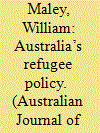

|
|
|
|
|
| Summary/Abstract |
Refugee policy involves a two-level game. For Australia since approximately 1998, the politics of refugees has been toxically affected by domestic politics. This has had potentially negative effects on Australia’s reputation and soft power. This article provides an overview of the issue, explores the ways in which considerations of domestic politics have come increasingly to shape Australia’s policy and concludes with a discussion of the consequences of Australia’s treatment of refugees for its diplomacy and soft power.
|
|
|
|
|
|
|
|
|
|
|
|
|
|
|
|
| 13 |
ID:
113702
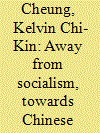

|
|
|
|
|
| Publication |
2012.
|
| Summary/Abstract |
Following the success of China's economic reform in the past few decades, Chinese nationalism has entered a new stage. The sentiment born of 'the century of national humiliation' is insufficient to explain the phenomenon of Chinese new nationalism. In this new era, China no longer regards the West as the benchmark against which it defines its success, but is becoming more assertive about its own values and perspectives. This emphasis on a Chinese perspective is related to the cultural shift in China's post-socialist transition, where the source of legitimacy in China's development has moved from an ideological dimension of socialism to a cultural dimension of 'Chinese characteristics'. Following this transition, growing importance is being placed on an indigenous voice in many aspects of China's development, including the recent efforts to reinvent traditional Chinese culture as a source of China's soft power. In particular, with strong state sponsorship, Confucianism is being revived as a new nationalist discourse, which not only provides new discursive resources for continuing authoritarianism in mainland China, but also redefines governance and nation-building with respect to Hong Kong and Taiwan.
|
|
|
|
|
|
|
|
|
|
|
|
|
|
|
|
| 14 |
ID:
186919
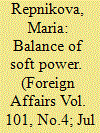

|
|
|
| 15 |
ID:
170655
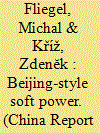

|
|
|
|
|
| Summary/Abstract |
This article examines China’s unique soft power conceptualisation, which differs from the American coinage. It contributes to the existing literature by demonstrating how soft power is theorised by Chinese academicians and policymakers in a distinct way. That means, according to China’s own tradition, predating the term. Unlike in America, where soft power is largely developed freely, in China, it is highly centralised. As a rising power, the People’s Republic initially concentrates on building domestic soft power, primarily through socialist culture and virtuous governance. These are in turn displayed to the outside world. Beijing uses multiple channels to tell the China story and has been setting up international platforms to portray itself as a responsible global actor. Several soft power indexes show that China holds a relatively positive image in Africa and South America. In Asia, views are mixed, while in Europe and North America, they remain low.
|
|
|
|
|
|
|
|
|
|
|
|
|
|
|
|
| 16 |
ID:
172613
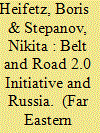

|
|
|
|
|
| Summary/Abstract |
This article analyzes the six-year period of implementation of the global Chinese project One Belt, One Road (OBOR), or the Belt and Road Initiative (BRI). Its positive aspects are highlighted: expanding the number of participants and their areas of interaction, creating a powerful financial base, creating new transborder transportation routes, increasing trade and investment among the countries participating in the project. Problems have been identified, including the lack of transparency of OBOR projects, insufficient consideration of national interests and local needs of China's partners, increasing their geopolitical risks, and the "debt trap" of Chinese loans. Possible ways of deepening the Russian-Chinese interaction at the new stage of BRI 2.0 development are proposed.
|
|
|
|
|
|
|
|
|
|
|
|
|
|
|
|
| 17 |
ID:
177528
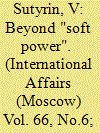

|
|
|
|
|
| Summary/Abstract |
AT THE TURN of the 1990s, when the bipolar world order had fallen apart and the U.S. and the EU had launched their expansionist foreign policy, the West simultaneously formulated the "soft power" concept1 and reissued, so to speak, the philosophical idea of civil society.2 It was a new form of substantiating democracy designed to apply Western patterns in post-socialist societies through nongovernment organizations (NGOs) as agents at the middle and low levels.
|
|
|
|
|
|
|
|
|
|
|
|
|
|
|
|
| 18 |
ID:
131882
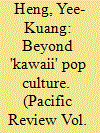

|
|
|
|
|
| Publication |
2014.
|
| Summary/Abstract |
Many studies of Japan's soft power are premised on the 'affective' dimensions of its kawaii pop culture that generate liking or interest. While entirely warranted, emphasising cultural attraction does not do sufficient justice to the multi-faceted foundations of Japanese soft power. Neither does it recognise other components of Joseph Nye's soft power framework stressing the 'normative' appeal of policies that reflect global norms. This article investigates the 'normative' dimensions of Japan's soft power on climate change, and whether it translates into international influence, as Nye predicted. The first section examines the Cabinet's 2010 New Growth Strategy, identifying a potential source of 'normative' soft power in its self-proclaimed desire to reinvent Japan as a 'trouble-shooting nation on global issues', specifically environmental challenges. Next, it analyses how Japanese entities (government, corporations, and NGOs) can transmit 'normative' soft power, and obstacles encountered. These transmission mechanisms include 'Cool Earth Partnership' programmes, the 'Future City Initiative' and the values-based Satoyama Initiative. The final section addresses conceptual implications that arise, and assesses whether Japan's 'normative' soft power has paid dividends. Drawing from literature on pioneer states and external reviews of Japan's alignment with key climate norms, the paper suggests that Japan's normative soft power is lacking in driving agendas at global climate forums. At a pragmatic problem-solving level, however, Japan is increasingly perceived as an attractive source of transferable solutions, reflecting climate norms such as developing eco-friendly technologies and providing assistance to help vulnerable countries mitigate climate change
|
|
|
|
|
|
|
|
|
|
|
|
|
|
|
|
| 19 |
ID:
105672
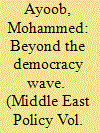

|
|
|
| 20 |
ID:
175318
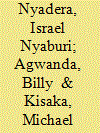

|
|
|
|
|
| Summary/Abstract |
This paper seeks to revisit the narratives surrounding China and Africa relations. While these engagements have attracted the attention of scholars and policymakers, the emphasis has been on the economic aspects and a little attention has been made to examine the role of non-economic drivers. This paper argues that even though economic drivers are significant, Africa and China relations go beyond economic drivers. It identifies non-economic factors like the personality of president Xi Jinping and his personalised relations with African leaders, perceived attitudes of Western countries towards the continent, China’s political system, politics of mega projects in Africa, China’s soft power strategies and historical experiences as significant factors in strengthening relations between Beijing and the continent. It looks at attractiveness as an important concept in understanding states’ actions and relations. The paper concludes that engagements between China and Africa maybe characterised by huge economic factors, but the foundation of these relations is attractiveness anchored on a number of non-economic drivers.
|
|
|
|
|
|
|
|
|
|
|
|
|
|
|
|
|
|
|
|
|